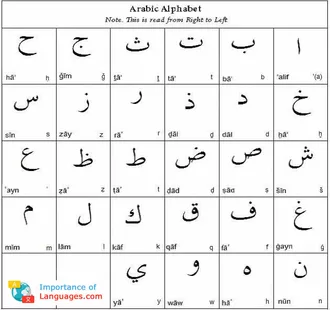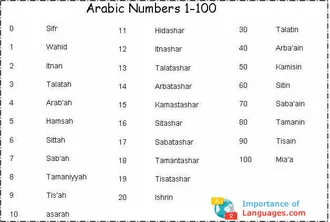Contents
Learn Basic Arabic Language Guide
Arabic is spoken by an estimated 280 million people around the world and is the official language of 20+ Countries in the Middle East and Northern Africa. You probably already have your own reasons on whether or not you want to begin learning Arabic or not. You may have doubts or simply lack the necessary motivation to learn. Many people have various reasons for learning any language. So I humbly submit 5 reasons on why you should consider learning Arabic as a second or possibly third language.
Why Learn the Arabic Language?
- The high demand and low supply of English Arabic-speakers.
Relatively few Americans attempt to learn Arabic. With the increasing influence of the Middle East in international affairs, there is an extreme shortage of workers in the United States that know the Arabic language and culture. People who study Arabic can find careers in various fields such as: Journalism, Business, Financial, Translation, Consulting, and various other career opportunities to name a few. As little as 1% of 12,000 FBI agents have very little knowledge of Arabic, and this includes those agents that can only read or write a few words of Arabic. - Arabic is the 5th largest spoken language in the world.
Arabic is the official language of over 20 countries and there are well over 300 million native speakers of the language. These speakers are largely concentrated in the Middle East, but there are minority groups of native speakers throughout the world. It is also an official language of the United Nations, the Arab League, the Organization of Islamic Conference, and the African Union. - Arabic is essential in understanding the Qu’ran and Islam Arabic language is an important part of Islamic religion, in fact an inseparable part.
It is the language of the Holy Qur’an. Millions of Muslims and native speakers around the world learn Arabic just to study and understand the Qu’ran. - Europe / America has an increasing Arab-American minority.
According to the U.S. Census Bureau’s 2002 census, there are 1.2 million people of Arab heritage residing in the United States. Though a relatively small population, their numbers are quickly growing; people of Arab ancestry in the U.S. increased by about 40% during the 1990s. Intercultural understanding begins at home. Even just a basic knowledge of the Arabic language and culture can improve understanding and acceptance of this often misunderstood and misrepresented group of Americans. - Arabic influence on products from around the world.
The export of concepts, products, and cultural practices from Arabic-speaking peoples is evident in the vocabulary that Arabic has lent other languages. Algebra was invented by Arab mathematicians in medieval times. Such staple products as coffee and cotton came from the Arab world, as well as jasmine, lemon, and lime. Other Arabic loanwords appearing in English denote such diverse things as henna, macrame, lute, mattress, gerbil, sorbet, safari and muslin. The influence of Arabic culture is even apparent in the English language.
Each region has it’s own regional Arabic dialect, although the standard dialect is Modern Standard Arabic which is understood by many but can be considered too formal.
How difficult is Arabic to Learn?
Depending on your approach to learning Arabic can be a moderately hard language to learn if you don’t have the right mindset. You should always try to maximize your resources and time for the best learning experience possible.
All languages evolve over time and Arabic is no exception. To indisputably understand the importance of the Arabic language you have to learn the actual language yourself to help to receive the full benefit of this amazing language later
Learn Arabic Fast
Five Easy techniques to Learn Arabic Rapidly
Learning to speak Arabic can be quick and easy with our Arabic language courses and learning aids. Whether you are looking for an Interactive Arabic course like Rocket Arabic or other computer-based Arabic language courses like Rosetta Stone, we have what’s right for you. Before you know it, you’ll be on your way to learning Arabic fast.
Learn Arabic fast on the Go
Having a busy life shouldn’t keep you from trying to learn Arabic fast. We offer several Arabic language courses that will allow you to learn to speak Arabic while driving, exercising, doing housework, etc. This means you can learn Arabic anywhere, anytime. The ease with which you’ll learn Arabic is amazing.
Can I Really Learn Arabic Fast?
The answer is YES! Learning Arabic is easier than ever with our full line of Arabic language courses and learning aids. Learning Arabic is not as hard as you might think. With all the available Arabic resources, you can learn while commuting, while watching TV or while sitting in front of the computer. If you want to learn to speak Arabic, there is no excuse to not. The world is at our fingertips and learning Arabic will help you better communicate with everyone.
Here are 5 tips to Learn Arabic Fast:
- Keep setting Objectives
Decide how many minutes each day you are going to set aside for your Arabic studies. Stick to this no matter what comes about. Setting a goal to study each day will help you more quickly achieve your goal to learn Arabic fast. - Set a Daily Routine
Know what time you are going to study Arabic each day. This is part of your goal setting but of equal importance to your success. Your time might be first thing in the morning. Or it might be on your evening commute home. Whatever the time is, stick to it. - Write Down Arabic Words and Phrases
Buy yourself a notebook to use for your Arabic studies. In your notebook take notes of the words or phrases that may be difficult for you to remember. Spell them out. Write their definition. You’ll be surprised with how much this will help you in your goal to learn Arabic fast. - Collect Arabic Articles and Pictures
Keep a folder and collect Arabic articles and pictures about the language and country you are learning about. You might find an article about Egypt or Iraq. Add those to your folder. The internet is full of Arabic language newspapers. Print off some articles to look over and see how many words you recognize. - Have Fun Learning Arabic!
There is no sense setting a goal to learn Arabic if you don’t have fun. Use your new language skills to practice with native Arabic speakers. And before you know it, you’ll be on your way to learning Arabic. Good luck and have fun!
Arabic Alphabet

Learning to read the Arabic Alphabet should be the first stop for Arabic beginners.
The first thing that sticks out is that Arabic is written right to left.
Arabic has 28 characters and most of them are consonants with no capitals and small letters.
Unlike the Arabic alphabet, Arabic numbers are written left to right like English.
Arabic Number System

Understanding how to write the Arabic number system takes very little time and effort to learn.
When you write Arabic numbers, they go from left to right, like English words and numbers, but the opposite for the Arabic language. Here are some examples of how to write Arabic Numbers.
It’s actually pretty straightforward when it comes to learning how to use the Arabic number system. Pronouncing Arabic numbers on the other hands get a little bit tricky. Arabic numbers 1 to 10 should be your primary focus when you begin.
Arabic Vocabulary for Numbers
| Zero | Sifr |
| One | Wahid |
| Two | Itnan |
| Three | Talatah |
| Four | Arab’ah |
| Five | Homsoh |
| Six | Sittah |
| Seven | Sab ‘ah |
| Eight | Tomanlyyah |
| Nine | Tis’ah |
| Ten | Asarah |
Arabic numbers after gain a suffix added to the base number. To illustrate what I mean, here are Arabic numbers 1 to 100.
Arabic Numbers beginning at ten through nineteen gain the suffix “tashar” added to the base number.
Arabic numbers from 13-19 work like this.
However the number twenty adds wa- to the mix. So it goes base number + wa- + the appropriate suffix. Example of how to write the pronunciation of Arabic numbers below.
Arabic Vocabulary and Phrases
The logical next step for Arabic beginners after learning the Arabic Alphabet would be to start developing your Arabic vocabulary with Arabic words and phrases. Pronouncing Arabic words can be challenging at first because some sounds in Arabic are pronounced deep in the throat and may not be familiar for Arabic beginners at first. I put together two posts of Arabic vocabulary and one post of Arabic phrases for Arabic beginners to start building their knowledge of Arabic Words and Phrases.
How to Introduce Yourself in Arabic
My name is Esmee…
What’s our name? Ma esmouk?
Nice to meet you! Motasharefon bema ‘refatek
I have to go Yajebu an athhaba al aan
I will be right back! Sa arje’o halan
Common Arabic Phrases: Arabic Phrases

Consider an Online Arabic Language Course
If you’re really serious about learning Arabic and want to maximize your time then you should consider using an Arabic language course to further aid you in your quest to learn Arabic. There are several great programs out there that deliver a great language learning experience.
The advantages of a language learning program are the organization and having the next step already lined up. Most break down the lessons into 30-minute intervals that can fit into any type of schedule. Flexible to retry a lesson to make sure you understand what you are learning and give you confidence in succeeding.
Free Arabic Language Courses
- Arabic for Global Exchange – Web site
- From Carnegie Mellon, a mini-course for individuals with no proficiency or extremely limited knowledge of Arabic language and culture who are about to begin study or work in an Arabic-speaking context.
- Arabic Language Lessons – Web Site
- The US Peace Corps serves up free lessons that will teach you the Arabic spoken in Jordan, Tunisia, Morocco, Chad and beyond.
- Arabic Lessons on Spotify – Spotify
- Over 12 hours of Arabic lessons for beginners.
- Arabic for Beginners 1 – YouTube Free
- A series of video lessons from Dalarna University in Sweden.
- Arabic in Jordan – Web Site
- These lessons from the Peace Corps will help you learn normal conversation in Jordan, rather than focusing on formalities.
- Foreign Service Institute Written Arabic – Vol 1 – Vol 2
- Spoken exercises in Arabic and the printed transcriptions. Four textbooks (PDF) and 31 audio lessons (MP3).
- Foreign Service Institute Levantine Arabic – Web site
- Introduction to pronunciation. Textbook (PDF) and 19 audio lessons (MP3). Scroll down to the second set of lessons on this page.
- Foreign Service Institute Saudi Arabic – Web site
- Covers the urban Hijazi dialect. Textbook (PDF) and 51 audio lessons (MP3). Scroll down to the third/bottom set of lessons on this page.


I want a full lecture
Hello Dulaj,
This webpage is just a beginner guide to the Arabic Lanaguage.
We would recommend trying a full language learning service like:
http://www.rosettastone.com
http://www.duolingo.com
http://www.busuu.com
Sally
I want to learn Arabic quickly. I’m currently in Saudi Arabia and it’s my first time in here. So I need your help.
Hello Namubiru,
I would recommend you find an Arabic School / Teacher in Saudi Arabia.
Or try a beginner Arabic program online from:
http://www.rosettastone.com
http://www.duolingo.com
http://www.busuu.com
Sally
Hello Morgan!
My name is Jean Claude BUCYANSENGA from Kigali.
I like your comments and i like languages as you do.
I have challenges of practice with native or any other person who tries to speak the language i want to practice.
many vocabularies and enough will but exercise makes perfect.
I miss this important key.I have notion ,in arabic, german,chinese,small russia but i sometimes forget some of them due to lack of practice.English ,French ,and swahili were my languages which i used in different subject when i was in primary and secondary studies.
God bless you Sally Morgan and all who make their effort to help people communicate in different languages
Very good effort but I noticed that in some words the pronounciation is wrong.
Hello Iman
Can you explain the mistakes?
i will like to learn Arabic language
Hi Sally,
I really want to learn Arabic and have been looking around for resources. The main I have trouble with, and I’m sure I’m not the only one, is pronunciation. It is an extremely important part of learning Arabic and whilst many of these tables are helpful none of them include how to pronounce these words phonetically. Either as a recorded voice or, at the very least, as explained written words and phrases. In the same way it is done for children learning English or non English speakers learning English.
I understand from a friend from Egypt that much of Arabic is pronounced by sounds made in the back of the throat. Perhaps making a table that has each of these sounds so that they can be practiced. That would mean when you try to pronounce words you would have a much better idea and chance of pronouncing them correctly.
theres a p and a u the u comes in waaw and the p is faa but 3 dots.